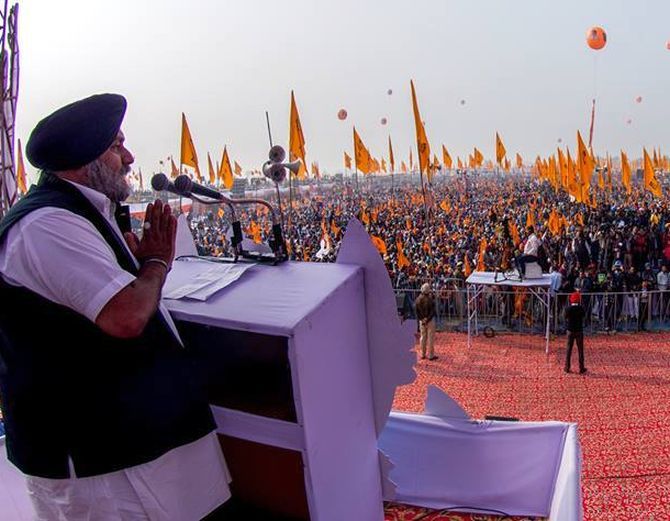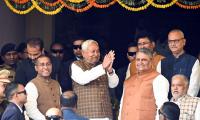There is anti-incumbency in urban areas.
But rural Punjab, the Akali base, will hold the key, reports Sahil Makkar/Business Standard.

Harpreet Singh, a taxi driver, is confident that the popularity of the Parkash Singh Badal-led Shiromani Akali Dal government has not waned in Punjab's villages after 10 years.
This was despite an anti-incumbency mood, the rise of drug usage in the state and other such issues.
"Pind vich teh loki Badalsahab nu hi pasand karde hai (People like Badal in the villages)," says Singh, a Jat Sikh from Rohno Khurd village in Ludhiana district.
"Villagers feel every party and leader is corrupt and so it is better to vote for those who advocate for their panth (the Sikh sect) and benefit them through social schemes," he adds.
The Akalis consider themselves the principal representatives of Sikhs, after their party came into existence in 1920 as a task force of the Shiromani Gurdwara Prabandhak Committee, the highest Sikh religious body.
The Badals (there is Deputy Chief Minister Sukhbir Singh Badal, the patriarch's son, and then others) hold over the villages had won the SAD-Bharatiya Janata Party alliance 42 of the 66 rural seats in the 2012 assembly election.
The Akali Dal-BJP alliance also won half the 34 seats in semi-urban areas, despite strong anti-incumbency.
The alliance is expecting to repeat that success, as two-thirds of the state population continues to live in villages.
Urban areas comprise barely 17 of the 117 assembly seats.
The reason people attribute to the 2012 assembly election results was the opening of state coffers by the Badals at the close of their earlier tenure.
State-sponsored schemes largely benefited the poor, Dalits and the farmers in the state. Government officials say the Badals are using the same strategy for the coming assembly poll.
They have promised free schoolbags to girls, cheap loans to women entrepreneurs, interest-free crop loans to small farmers, 4,000 modern gymnasiums for youth and a Rs 100 crore (Rs 1 billion) scholarship fund for Dalits.
The Akali party is learnt to be spending a huge amount to take the air out of the Congress and Aam Aadmi Party campaigns.
The biggest advantage the Akali Dal seems set to gain is from the AAP rise.
AAP surprised everyone in the 2014 Lok Sabha elections by winning four of Punjab's 13 seats and around 33% of the votes.
"AAP is making a dent in anti-incumbency votes, which otherwise would have come to us," admits a former Union minister and Congress leader.
"If AAP manages to win 15% to 20% of the total votes, the Congress will lose. It is most likely that the SAD-BJP alliance might come to power with a thin majority or it will be a hung assembly," he adds.
In the current scenario, 15% will make a huge difference in the outcome of the 2017 assembly elections.
The SAD and Congress were neck and neck in the 2012 election, with 42.4% and 40.1% respectively of the votes in the seats they had contested.
As a percentage of total votes in all 117 seats, the SAD vote percentage at 34.7% was less than the Congress at 40%, but it managed to win 10 more than the latter.
Overall, 22 assembly seats were closely fought between the Congress and the SAD-BJP.
"In urban areas the swing voters (other than staunch party acolytes) are currently confused between the Congress and AAP. Though AAP has lost its initial momentum, some sections, including youth, seem inclined towards the new party," believes J P Talwar, a businessman in Punjab's most populated city, Ludhiana.
AAP also believes it can get the largest share of the state's 32% Dalit votes.

Political experts in the state, however, feel the current demonetisation scheme announced by Prime Minister Narendra Modi on November 8 is negatively impacting the AAP more, rather than the Congress or SAD.
"Moreover, Arvind Kejriwal has lost the moral high ground by siding with Lalu Prasad and Mamata Banerjee on the currency ban issue, whereas Prime Minister Modi has carved out his space on this matter," feels Pramod Kumar, director of the Institute for Development and Communications.
"If the central government manages to announce some rebate in income tax during the financial budget, it might change the tide in favour of the SAD-BJP," Kumar adds.
Some feel there is no undercurrent in support for all the three main contenders. They believe AAP will not be able to form a government on its own, but will spoil the Congress' chances.
The other thing which might hurt the Congress is seat distribution, lack of enthusiasm among its cadre and internal feuds.
The party has already made up its mind that if there is a hung assembly, it will not join hands with AAP. "That will be political suicide," says the Congress leader.
However, it is true that people in urban Punjab seem inclined to change the regime. But it is the SAD' ally, the BJP, which mostly contests urban seats.
The SAD strength continues to rest in rural areas.














